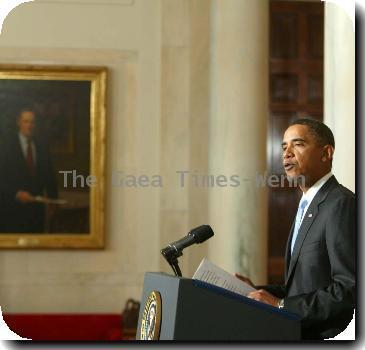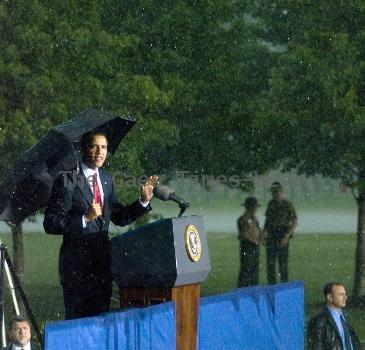Jobless aid, tax bill hits another Senate roadblock as Medicare cuts loom on Friday
By APThursday, June 17, 2010
Jobless aid, tax bill hits Senate roadblock again
WASHINGTON — In another stinging setback for President Barack Obama and Democrats controlling Congress, the Senate on Thursday rejected long-sought legislation to provide stimulus spending and a reprieve for doctors about to get hit with a big cut in their Medicare payments.
The failed measure, killed by a GOP filibuster, would have provided further jobless aid for the long-term unemployed, $24 billion in aid to cash-strapped state governments and the renewal of dozens of popular tax breaks for businesses and individuals.
Less than a week ago, Obama reissued a plea for more stimulus spending as insurance against another recession. But the measure instead fell victim to election-year anxiety over huge federal deficits despite being pared back by Democratic leaders.
The 56-40 vote late Thursday fell four votes short of the 60 required to break the GOP filibuster. Not a single Republican supported the measure even though nine GOP senators had supported even more costly legislation in a procedural vote just three months ago. Ben Nelson of Nebraska was the only Democrat to vote with Republicans to filibuster the measure. Independent Joe Lieberman of Connecticut, who caucuses with Democrats, also joined in the filibuster.
Efforts to woo a handful of Republican moderates like Maine’s Susan Collins and Olympia Snowe flamed out despite daylong efforts and a move by Democrats on Wednesday to trim the bill. Further cuts were contemplated, though the talks were closely held.
“We’re not going to give up,” Majority Leader Harry Reid, D-Nev., said. But there’s no clear path forward for the bill, which has bedeviled lawmakers for months.
There was some urgency to pass the jobless measure since by the end of the week, more than 900,000 people out of work for more than six months will have been ineligible to apply for continued benefits, according to the latest Labor Department estimates. And doctors face a scheduled 21 percent cut in Medicare reimbursements effective Friday.
“Tonight, every single Republican voted to give doctors a 21 percent pay cut,” Reid said.
In fact, efforts to pass a stand-alone measure to forestall the Medicare cuts could be revived as early as Friday. Senate Minority Leader Mitch McConnell, R-Ky., appeared amenable to a compromise floated late Thursday that would give doctors six months of relief from the Medicare cuts, accompanied by measures to ensure the payments wouldn’t add to the deficit.
The broader measure long had been considered a must-pass bill since failure to pass it would cut off jobless benefits, force about 30 states to rewrite their budgets to make up for lost federal aid and impose the Medicare cut on doctors. Republicans supported many of the policies in the bill but began making ever more stringent demands to pare back its deficit cost.
On Wednesday, after losing a test vote by a wide margin, top Democrats cut the measure’s deficit impact by $25 billion — to $55 billion over the upcoming decade — and made a host of changes aimed at winning over GOP moderates and wayward Democrats. They included easing proposed tax increases on venture capitalists and small businesses organized as so-called S corporations.
“It’s moving in the right direction but it’s not there yet,” Collins said.
Democrats were clearly frustrated after a full day of talks with elusive Republicans.
“To be honest, given the attitude over on the other side of the aisle, I don’t know that there’s anything that’ll get a vote,” said Finance Committee Chairman Max Baucus, D-Mont., who just Wednesday had serenely predicted the measure would advance easily.
Republicans instead pressed an alternative plan to extend unemployment benefits and aid to doctors but to pay for them with spending cuts to reduce the budget deficit. It was easily killed on a mostly party-line vote.
The chaos in the Senate overshadowed successful efforts by the House to pass a bill to create a $30 billion government fund that would be available to community banks to increase lending to small businesses.
House Democrats projected that banks would use the fund to leverage up to $300 billion in loans to small businesses, helping to loosen tight credit markets. Republicans called the bill another bank bailout that would do little to increase lending to small businesses.
The bill passed by a vote of 241-182
Congressional Democrats began the year with an aggressive agenda of passing a series of bills designed to create jobs. One has become law, offering tax breaks to companies that hire unemployed workers. Others stalled as lawmakers, after hearing from angry voters, became wary of adding to the national debt, which stands at $13 trillion.
The White House has kept urging Congress to act on new stimulus measures, with Obama warning that “hundreds of thousands” of state and local government jobs could be lost without $24 billion in Medicaid money to help states balance their budgets.
Vice President Joe Biden said Thursday, “This is not a time to take — to use the metaphor — take our foot off the accelerator. We still need to continue to create jobs and spur job growth now.”
Tags: Barack Obama, Filibusters, Government Programs, Government Regulations, Government-funded Health Insurance, Industry Regulation, Labor Economy, North America, Personal Finance, Personal Taxes, Personnel, Political Organizations, Political Parties, Products And Services, Recessions And Depressions, Small Business, Small Business Financing, United States, Washington








